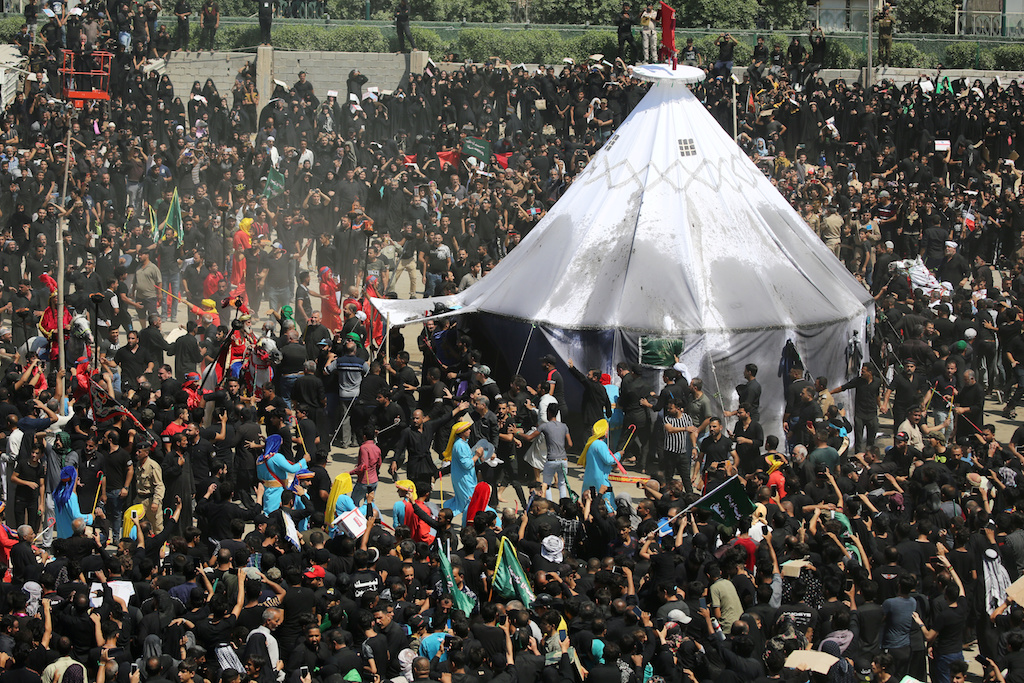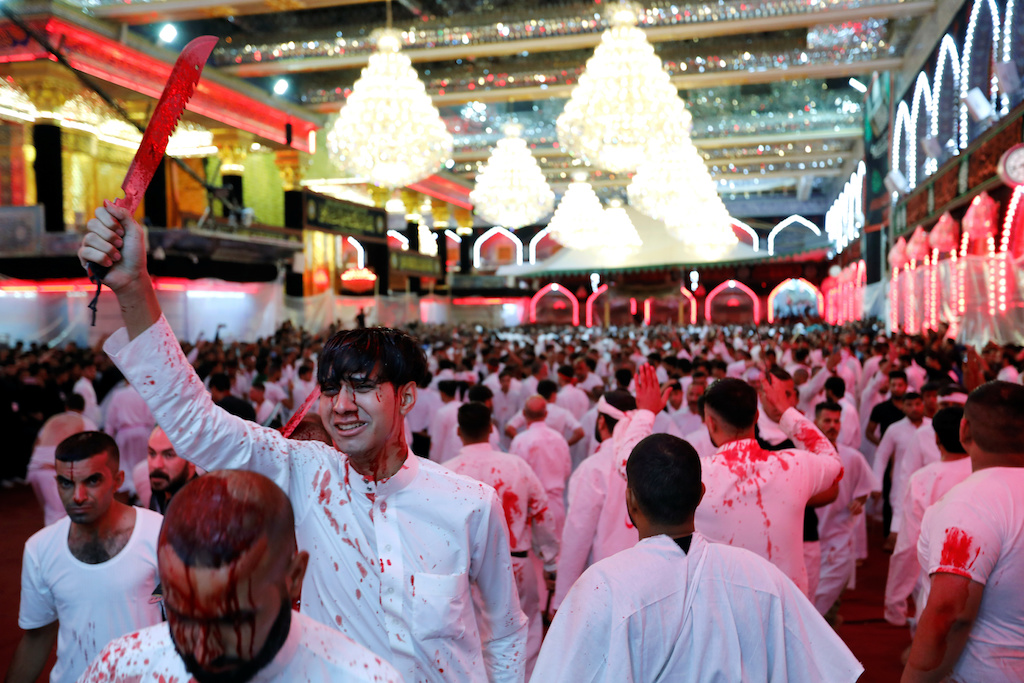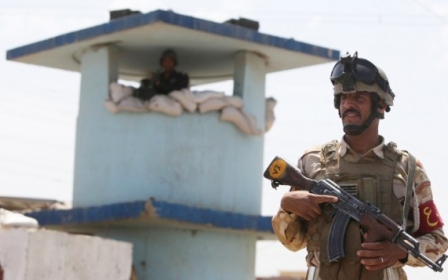Deaths at Iraq's Ashura festival will not deter millions of worshippers

For Iraq's Shia Muslims, the festival of Ashura marks a time of spiritual and historical mourning, commemorating as it does the death of the Prophet Muhammad's grandson Hussein at the battle of Karbala in 680.
This year, however, the historic tragedy was marred by a much more immediate one after more than 31 worshippers were killed in a stampede in the city of Karbala as they gathered for the annual festival on Tuesday, marking the tenth day of Muharram (first month of the Islamic calendar).
Earlier that day, hundreds of thousands took part in recreations of the battle, dressed in period clothing and hoisting banners and flags reading "Ya Hussein" and other slogans.
Some beat their chests with their hands, or with whips and chains. Others took part in the controversial ritual of Tatbir, cutting their heads open with blades as a sign of devotion.
A spokesperson for the Imam Hussein shrine in Karbala - a focal point for the numerous rituals - told Middle East Eye that between 12pm and 3pm around a million people had gathered to take part in the Tuwairij run, a ceremony that replicates the run undertaken by Hussein's brother Abbas from the village of Tuwairij to the battlefield at Karbala to aid Hussein.
Stay informed with MEE's newsletters
Sign up to get the latest alerts, insights and analysis, starting with Turkey Unpacked
A number of accounts have been given of what happened then - some have reported that a walkway collapsed, while others have said that during the run, someone tripped causing a crush around the entrance of the shrine.
One witness to the events told MEE that he had seen the crush sparked by an old man falling down at the Bab al-Raja gate leading to the courtyard of the shrine.
"We went directly to rescue the victims and we were trying to stop the huge mass of pilgrims aiming to give their loyalty to Imam Hussain but we couldn’t because of the flow," said Maytham al-Yasree.
"We were crying and trying to rescue them - we were able to rescue more than 100 people."
When pushed on who was ultimately to blame for the deaths, Yasree implied that the risk of death or injury was unfortunately always a possibility with gatherings of this size.
"It happens with events like this in other countries - especially an event which brings together more than four million people in three days," he said.
He added, however, that he hoped there would be better preparation of the roads by the local authorities "because the ambulance can’t move in events like these".
Violence and suppression
The incident is far from the worse to have taken place during Ashura - and past instances of violence have been far from accidental.
During the 2004 celebrations, attacks by al-Qaeda-linked militants claimed the lives of more than 178 people.
Since the declaration of the defeat of the Islamic State group in March 2019, however, many Iraqis are now hopeful that the threat of violence against future processions may no longer be all-consuming.
"There has been a threat to this pilgrimage by terrorists since 2003, with the forces of al-Qaeda and then IS constantly [threatening] the Shia and issuing fatwas to sanction their blood, money and property," said Sabah al-Talqani, a historian and scholar at the Imam Hussein shrine.
"But it is noticeable that this threat almost ended with the victory of Iraqis against the terrorist organisations," he said, adding that "remnants of dormant cells" presented a "limited threat in some areas of Iraq".
Ashura had been long suppressed by former ruler Saddam Hussein, who saw the displays of Shia devotion as a threat to his rule.
After his overthrow in the 2003 US-led invasion, millions of pilgrims flocked to take part in the ceremonies.
The pilgrimages to Karbala, including for Arbaeen which takes place 40 days after Ashura, have consistently been among the largest gatherings of people in the world, presenting logistical difficulties for the authorities.
Talqani told MEE that the pilgrimages to Karbala had been "increasing year after year, since the fall of the tyrant regime in 2003 to reach more than 15 million pilgrims in the last pilgrimage of al-Arbaeen."
"Before the fall of the regime, groups of pilgrims would hide in the side roads, agricultural roads and orchards and walk to Karbala at night, for fear of the oppression of the former regime and its tools, which were deployed in every village and city in the country," he explained.
"However at the time of the pilgrimage you saw tens of thousands - they gathered in the courtyard of the shrine and around it, in addition to the inhabitants of the city of Karbala, who were never dissuaded by the difficulties of doing the pilgrimage."
'Tragic loss of life'
Condolences and offerings of support came forth following the news of the disaster, both from within Iraq and abroad.
“We lament this tragic loss of life and wish those injured a swift and full recovery,” said US Ambassador Matthew H Tueller, while Iranian Foreign Ministry Spokesman Seyyed Abbas Mousavi expressed "deep regret" for the deaths.
Iraq's Prime Minister Adel Abdel Mahdi travelled to the city to meet with the survivors and said he would be taking "extra precautionary steps" to prevent future disasters.
Youths in the northern city Mosul, recently liberated from IS, lit candles in solidarity with the victims:
Despite Tuesday's tragedy, worshippers are unlikely to be deterred.
Yasree said that he and others would continue to draw strength from the "revolution of Imam Hussein".
"Because of its moral dimensions embodied in the victory of the oppressed and the realisation of social justice and human rights - which was sponsored by Imam Hussein on the day of Ashura, where he equated between the slave and the rich, white and black, Muslim and Christian."
Middle East Eye delivers independent and unrivalled coverage and analysis of the Middle East, North Africa and beyond. To learn more about republishing this content and the associated fees, please fill out this form. More about MEE can be found here.







